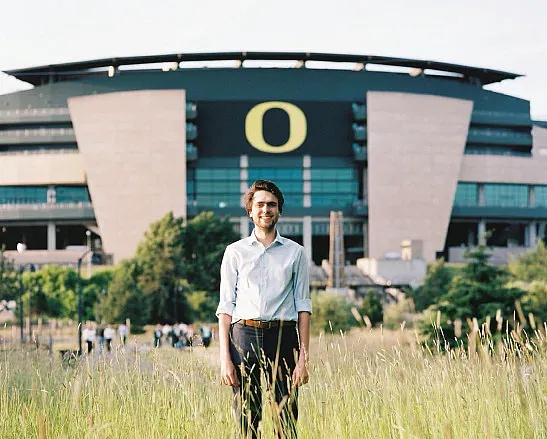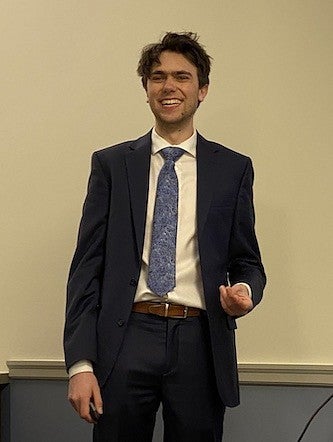
Fighting for those in need

Majors: Political Science and Economics
Hometown: Portland
Currently: First-year law student at Georgetown University
Song on repeat: “No L’s” by Smino
Coffee or tea: Yerba Mate
Advice for CHC students: Get involved in the community. It doesn’t have to be volunteering. Go to events. Work jobs and internships. As many of those things as you can.
Jakob Hollenbeck remembers answering the phone at the public defender’s office where he worked as an intern as a Clark Honors College student. An incarcerated woman cries on the other end, telling him that doctors found dark spots on her lungs.
They refuse to do further testing tests, she tells him. Her lawyers won’t listen and the prison guards aren’t taking her complaints seriously.
Before Hollenbeck knows it, he’s crying, too. He tries to console her and she ends the call with a “thank you.”
“You have to think about how awful the conditions in our prisons are for someone to end a conversation where you’ve told them: ‘Sorry, there’s nothing I can do,’” he recalls, “by effusively thanking you just for the fact that you’re listening.”
Hollenbeck, a 2022 Clark Honors College graduate, has been working on addressing mass incarceration since he was a junior year at UO. Now, he’s taking his curiosity and commitment to make an impact on the lives of the incarcerated to Georgetown Law School.
Hollenbeck and his younger sister were raised by their mother and father—immigrants from Iran and Germany, respectively—in Portland. Growing up with ADHD, Hollenbeck says he was always curious and loved school. But it wasn’t always easy.
He recalls plenty of times his diagnosis wasn’t accommodated in school. Once, a teacher kept him from going to recess so he could stay inside to work on his handwriting. Sometimes, he was punished for fidgeting or standing up from his seat during a lesson.
But he also remembers teachers who were kind and patient with him, who gave him control over his assignments, and fed his interests. “In eighth grade, my science teacher just let me teach a class on epigenetics, which was something that I was super into,” Hollenbeck recalls. “I’m very, very, very grateful for all of the teachers that I’ve had because they fostered my curiosity and love of learning.”
That love came from his mother, who taught English as a second language. When she was 13, she fled the Iranian Revolution with her sister. Alone in a foreign land, she faced racist classmates who harassed her daily.
When she became a teacher, she made sure that her students never felt the way she had. Hollenbeck remembers every year, his mother set up a Christmas gift drive for her students who were homeless.
Hollenbeck says he learned early on to be kind and pay attention to people in less fortunate situations.
Solutions to the world’s problems
Initially, he wanted to go into science, telling everyone that he was going to be a biomedical engineer. He says when Donald Trump was elected president in 2016 that his “political consciousness started to become more awakened.”
After Hollenbeck graduated from high school, he spent the summer reading books about politics and social science. “I was hungry for knowledge,” Hollenbeck recalls. “I wanted to understand how the world works for most people, so that I could improve it.”
At UO, Hollenbeck developed a deep interest in policing and incarceration. Through his research, he began to realize the magnitude of America’s mass incarceration problem.
“Instead of solving problems at the roots, we like to try to incarcerate those problems away,” Hollenbeck says. “We have so many problems in our society that we don’t actually address. We just try to hide the symptoms by putting people in cages where no one can see them.”
He thought about going into academia to do research on incarceration that would inform policy changes by government.
During his junior year, he learned from a friend working with Oregon prisoners of the effect the pandemic had on incarcerated people. His friend helped get him an interview for a legal assistant position in Oregon’s Office of Public Defense Services and he was hired.
For seven months, Hollenbeck conducted the group’s medical intake calls, speaking with hundreds of imprisoned people about their medical histories and experiences with COVID-19. It exposed to him the cruelty that imprisoned people faced during the pandemic.
Many prisoners who tested positive faced the isolation of solitary confinement, losing access to their families and any privileges they gained while incarcerated.
In the end, the public defender’s office reached a landmark agreement with the state that helped make improvements, including mandated masking; an increase in protective gear and supplies; and adding improved medical care for prisoners.
The experience shifted Hollenbeck’s focus and he declared: “I want to directly impact people’s lives on a daily basis.”
“I was hungry for knowledge,” Hollenbeck recalls. “I wanted to understand how the world works for most people, so that I could improve it.”
He later worked as a paralegal for David Vill, a Eugene lawyer.
Vill remembers his interview with Hollenbeck clearly. One thing that stood out, Vill says, was that the interview was far from one-sided. It felt like they were “interviewing each other.”
“He had more questions than anyone I’ve ever met,” Vill remembers. “He was very concerned about doing the right thing and being on the right side of justice.”
As they began working together, Vill says Hollenbeck’s empathy and dedication were particularly impressive. In one case, a parent wanted to have a Zoom session with their children, who they had not seen in years, but they didn’t have a computer. Vill remembers Hollenbeck coordinating with the parent’s sister to bring a computer and help them practice to make sure everything worked.
“For him to be able to bring them together,” Vill recalls, “for putting in extra effort to solve the problem that others couldn’t? I think those little things are special.”
A pattern of advocacy
At the same time, Hollenbeck was in the midst of his senior year and his Honors College thesis.
He had no idea what he was going to do. He recalls leaving a thesis class and realizing that his planned topic wouldn’t work, and he’d have to start from scratch. That’s when, biking to work, he remembered a particular case he was working on.
When visiting a youngster who had been recently placed with his father, the child disclosed that he didn’t feel safe there. There wasn’t any physical abuse, but there it seemed likely that there might be emotional abuse, Hollenbeck says. So he met with the caseworker, hoping his client could be moved.
He describes the situation: “The caseworker responded, ‘You know, it’s not ideal, but it’s just another form of parenting. We can’t intervene here.’ And that was really startling to me because this kid had just told me, ‘I don’t feel safe in this house. I want to leave.’ And the person who was supposed to be protecting him was telling us that’s not possible.”
After looking into more cases like these, Hollenbeck found a pattern in some parts of the juvenile dependency system dismissing emotional abuse as “just parenting.” Hollenbeck’s thesis exposed a pattern in Oregon and detailed solutions that would keep children safe from emotional abuse. It also earned him the Robert D. Clark Award from the Honors College for the top thesis.
This fall, Hollenbeck is immersed in his studies as a first-year law student at Georgetown Law. He was admitted with a full-tuition scholarship from the Blume Public Interest Scholars Program, which pays the tuition for a select group of Georgetown students each year.
Morgan Lynn-Alesker, the director of the program, says Hollenbeck’s application and her interviews with him stood out. “I really believed that he was committed to taking what he gets from the program and from Georgetown and making a difference in the world,” she says.
“Wherever he is, he is going to be an incredible advocate for change and for looking at the law with a thoughtfully intersectional lens. He’s going to do amazing things. I don’t know exactly what they’ll be, but I know they’re going to be impressive.”
